A Personal Reflection on Leadership, Employment, and Skill Development
VerifiedAdded on 2020/12/09
|8
|2256
|233
Report
AI Summary
This report presents a personal reflection on the author's employment experiences, primarily focusing on their time at the Hilton Hotel and Qbic hotel. It delves into the development of leadership skills, the application of Maslow's motivational theory, and the effectiveness of different leadership styles, including democratic and autocratic approaches. The author analyzes the significance of teamwork, the impact of emotions in the workplace, and identifies their strengths and weaknesses in employment. The reflection includes a plan for professional development, outlining strategies to improve time management, problem-solving, and leadership skills. The report concludes with a list of references that support the claims and insights presented throughout the reflection.
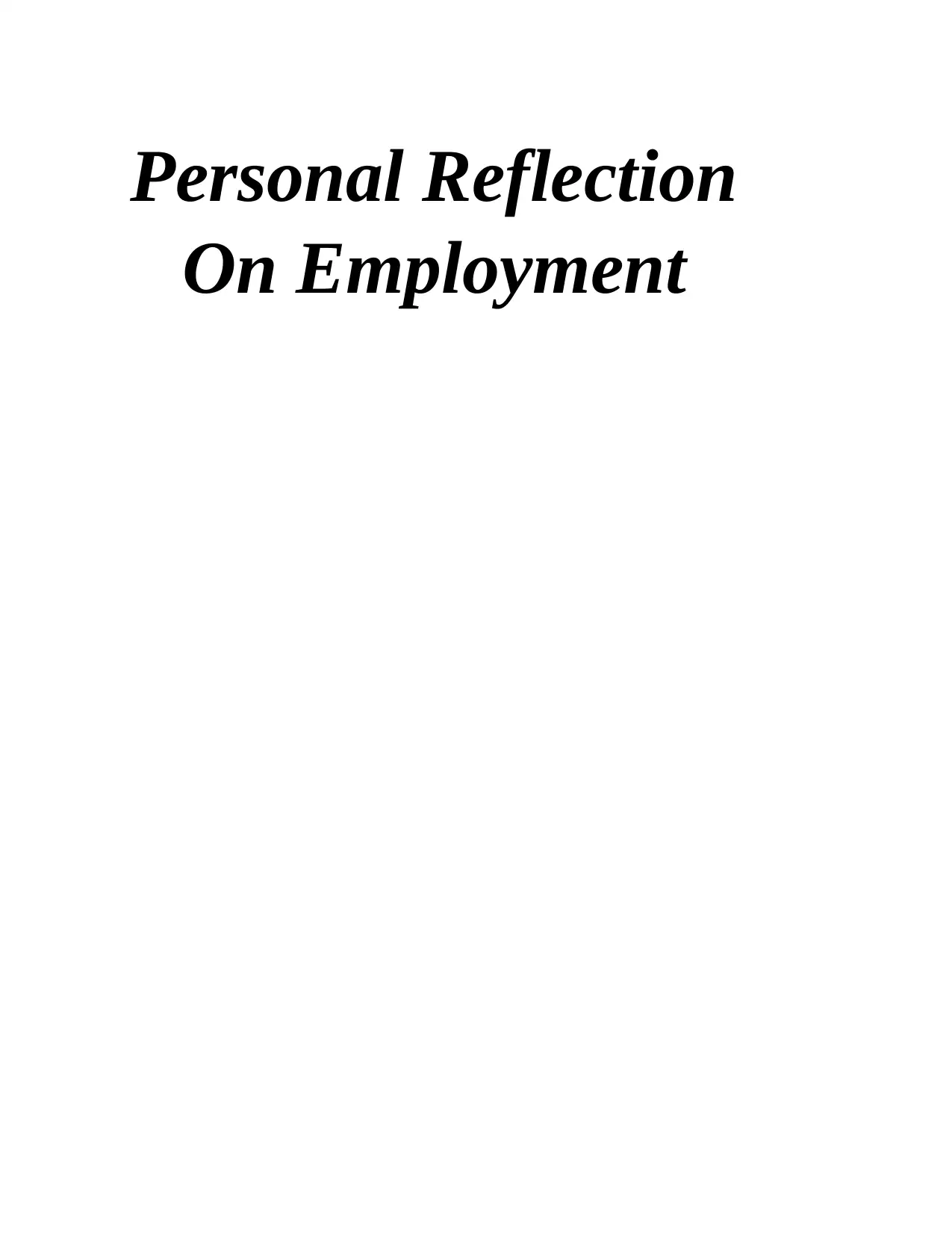
Personal Reflection
On Employment
On Employment
Paraphrase This Document
Need a fresh take? Get an instant paraphrase of this document with our AI Paraphraser
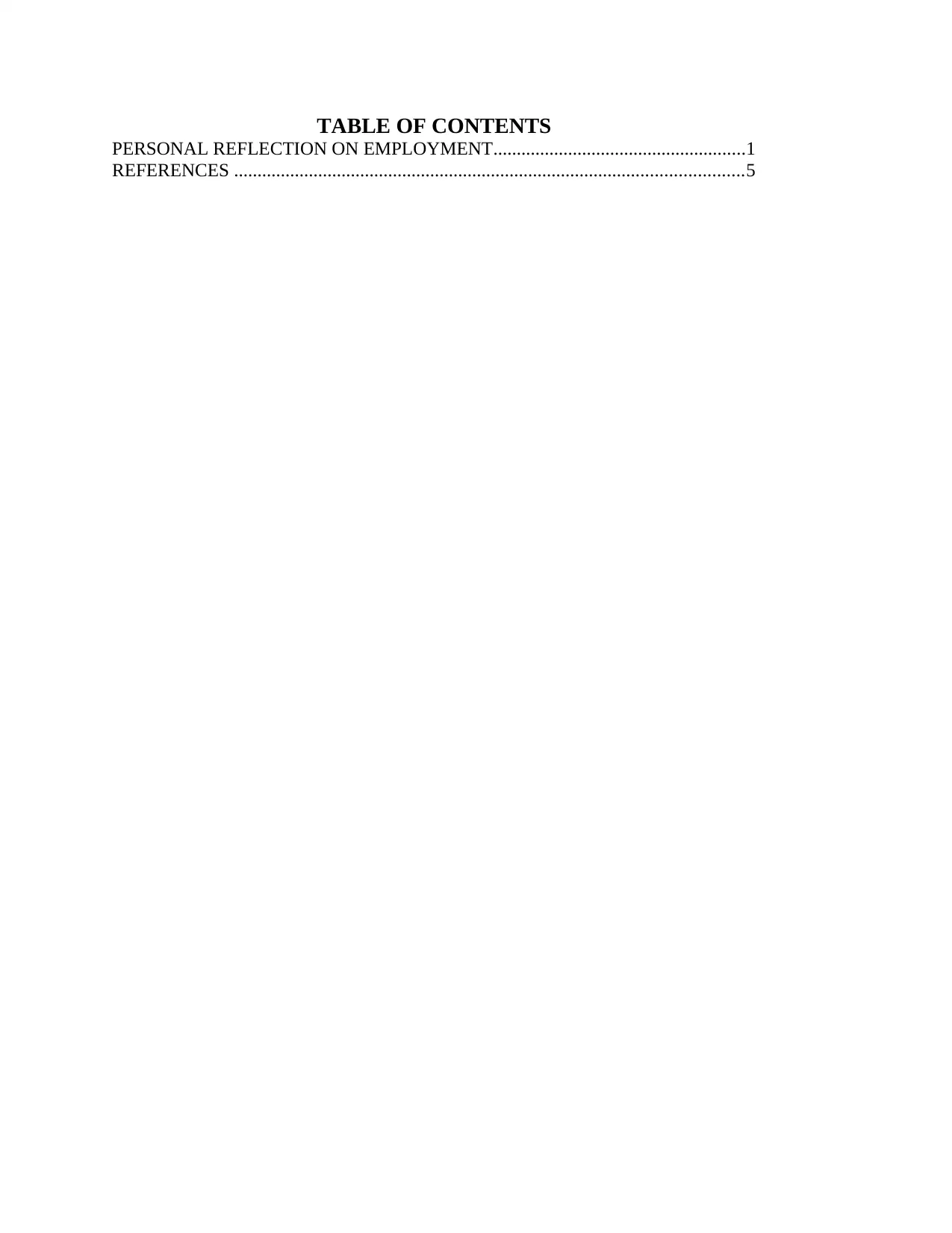
TABLE OF CONTENTS
PERSONAL REFLECTION ON EMPLOYMENT......................................................1
REFERENCES .............................................................................................................5
PERSONAL REFLECTION ON EMPLOYMENT......................................................1
REFERENCES .............................................................................................................5
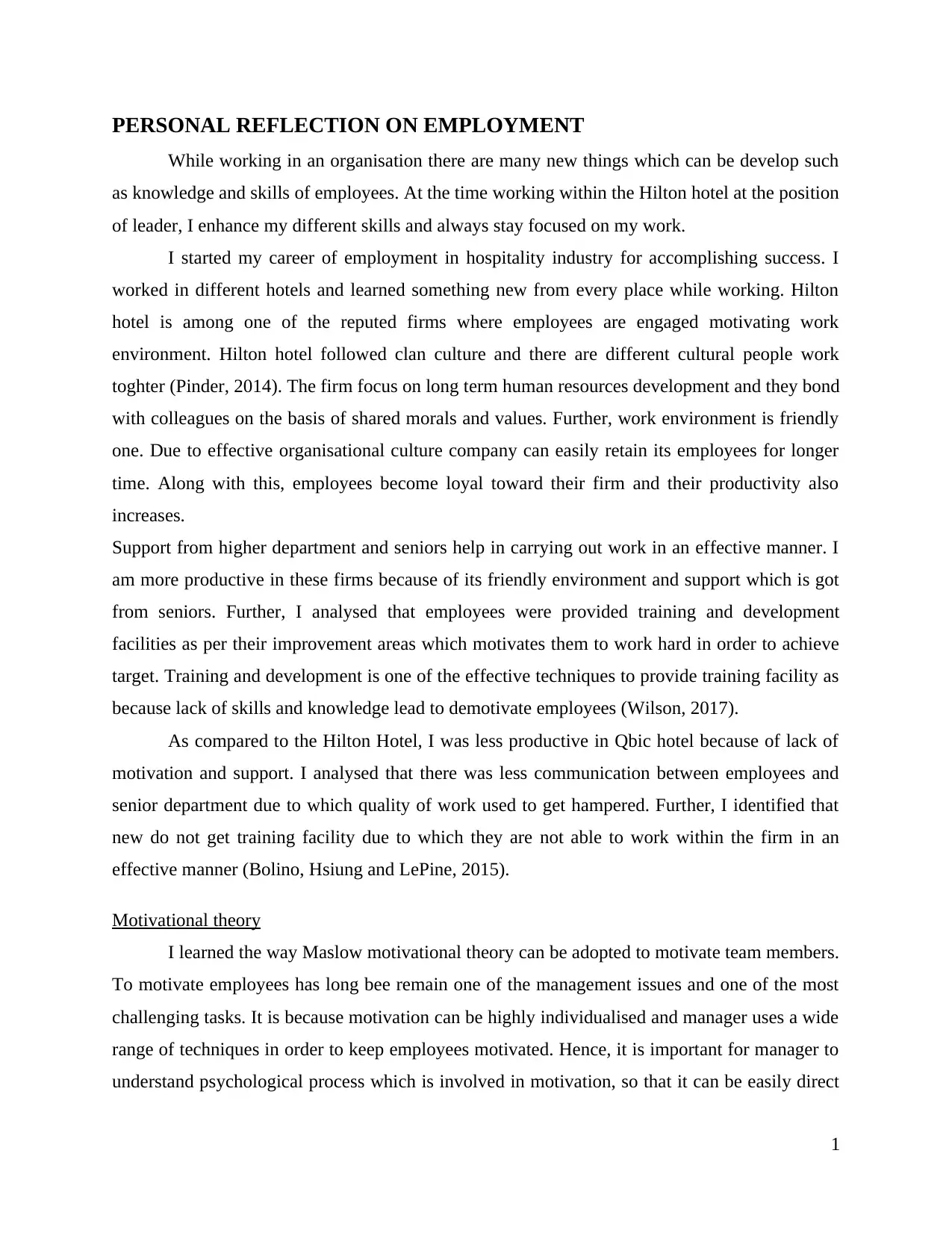
PERSONAL REFLECTION ON EMPLOYMENT
While working in an organisation there are many new things which can be develop such
as knowledge and skills of employees. At the time working within the Hilton hotel at the position
of leader, I enhance my different skills and always stay focused on my work.
I started my career of employment in hospitality industry for accomplishing success. I
worked in different hotels and learned something new from every place while working. Hilton
hotel is among one of the reputed firms where employees are engaged motivating work
environment. Hilton hotel followed clan culture and there are different cultural people work
toghter (Pinder, 2014). The firm focus on long term human resources development and they bond
with colleagues on the basis of shared morals and values. Further, work environment is friendly
one. Due to effective organisational culture company can easily retain its employees for longer
time. Along with this, employees become loyal toward their firm and their productivity also
increases.
Support from higher department and seniors help in carrying out work in an effective manner. I
am more productive in these firms because of its friendly environment and support which is got
from seniors. Further, I analysed that employees were provided training and development
facilities as per their improvement areas which motivates them to work hard in order to achieve
target. Training and development is one of the effective techniques to provide training facility as
because lack of skills and knowledge lead to demotivate employees (Wilson, 2017).
As compared to the Hilton Hotel, I was less productive in Qbic hotel because of lack of
motivation and support. I analysed that there was less communication between employees and
senior department due to which quality of work used to get hampered. Further, I identified that
new do not get training facility due to which they are not able to work within the firm in an
effective manner (Bolino, Hsiung and LePine, 2015).
Motivational theory
I learned the way Maslow motivational theory can be adopted to motivate team members.
To motivate employees has long bee remain one of the management issues and one of the most
challenging tasks. It is because motivation can be highly individualised and manager uses a wide
range of techniques in order to keep employees motivated. Hence, it is important for manager to
understand psychological process which is involved in motivation, so that it can be easily direct
1
While working in an organisation there are many new things which can be develop such
as knowledge and skills of employees. At the time working within the Hilton hotel at the position
of leader, I enhance my different skills and always stay focused on my work.
I started my career of employment in hospitality industry for accomplishing success. I
worked in different hotels and learned something new from every place while working. Hilton
hotel is among one of the reputed firms where employees are engaged motivating work
environment. Hilton hotel followed clan culture and there are different cultural people work
toghter (Pinder, 2014). The firm focus on long term human resources development and they bond
with colleagues on the basis of shared morals and values. Further, work environment is friendly
one. Due to effective organisational culture company can easily retain its employees for longer
time. Along with this, employees become loyal toward their firm and their productivity also
increases.
Support from higher department and seniors help in carrying out work in an effective manner. I
am more productive in these firms because of its friendly environment and support which is got
from seniors. Further, I analysed that employees were provided training and development
facilities as per their improvement areas which motivates them to work hard in order to achieve
target. Training and development is one of the effective techniques to provide training facility as
because lack of skills and knowledge lead to demotivate employees (Wilson, 2017).
As compared to the Hilton Hotel, I was less productive in Qbic hotel because of lack of
motivation and support. I analysed that there was less communication between employees and
senior department due to which quality of work used to get hampered. Further, I identified that
new do not get training facility due to which they are not able to work within the firm in an
effective manner (Bolino, Hsiung and LePine, 2015).
Motivational theory
I learned the way Maslow motivational theory can be adopted to motivate team members.
To motivate employees has long bee remain one of the management issues and one of the most
challenging tasks. It is because motivation can be highly individualised and manager uses a wide
range of techniques in order to keep employees motivated. Hence, it is important for manager to
understand psychological process which is involved in motivation, so that it can be easily direct
1
⊘ This is a preview!⊘
Do you want full access?
Subscribe today to unlock all pages.

Trusted by 1+ million students worldwide
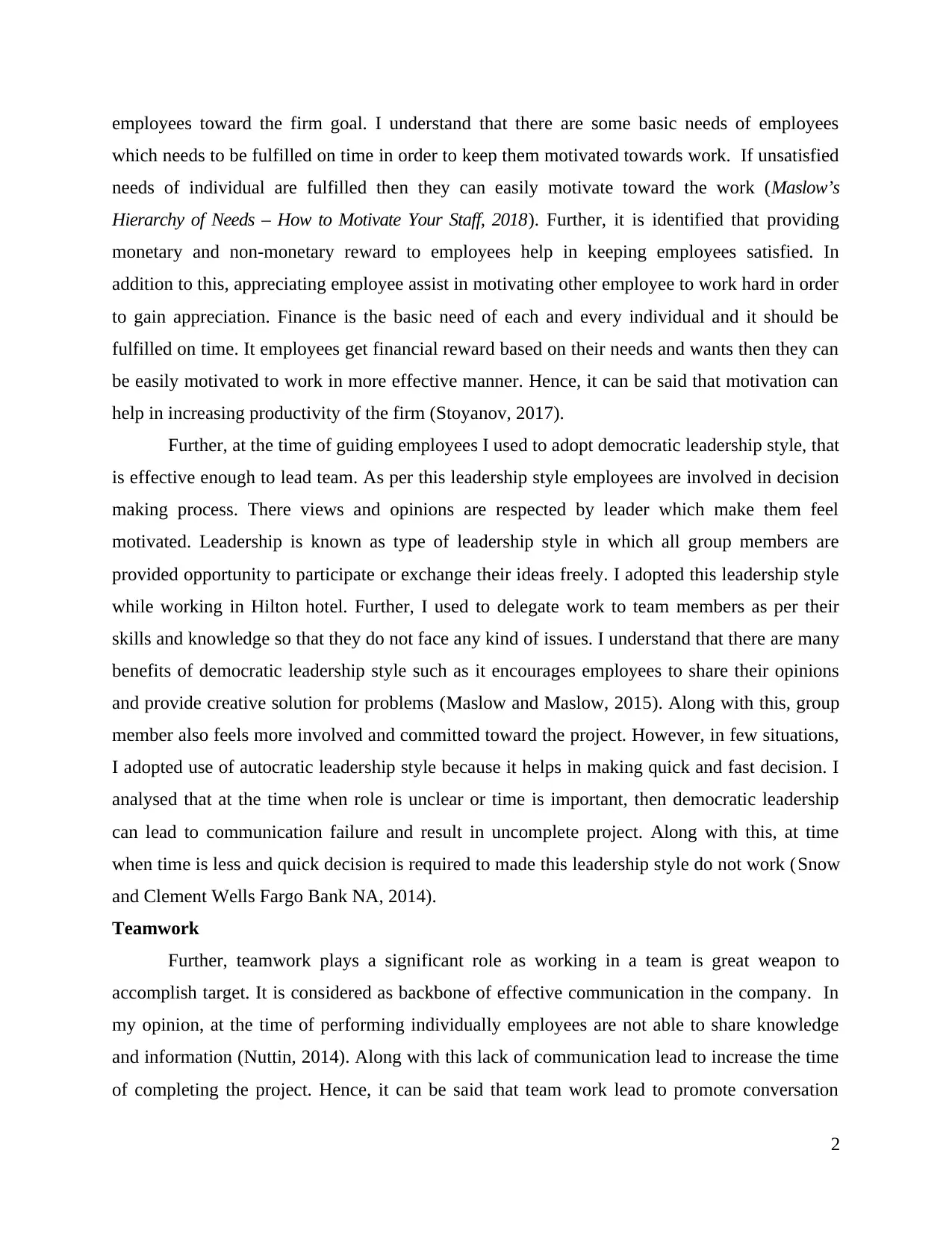
employees toward the firm goal. I understand that there are some basic needs of employees
which needs to be fulfilled on time in order to keep them motivated towards work. If unsatisfied
needs of individual are fulfilled then they can easily motivate toward the work (Maslow’s
Hierarchy of Needs – How to Motivate Your Staff, 2018). Further, it is identified that providing
monetary and non-monetary reward to employees help in keeping employees satisfied. In
addition to this, appreciating employee assist in motivating other employee to work hard in order
to gain appreciation. Finance is the basic need of each and every individual and it should be
fulfilled on time. It employees get financial reward based on their needs and wants then they can
be easily motivated to work in more effective manner. Hence, it can be said that motivation can
help in increasing productivity of the firm (Stoyanov, 2017).
Further, at the time of guiding employees I used to adopt democratic leadership style, that
is effective enough to lead team. As per this leadership style employees are involved in decision
making process. There views and opinions are respected by leader which make them feel
motivated. Leadership is known as type of leadership style in which all group members are
provided opportunity to participate or exchange their ideas freely. I adopted this leadership style
while working in Hilton hotel. Further, I used to delegate work to team members as per their
skills and knowledge so that they do not face any kind of issues. I understand that there are many
benefits of democratic leadership style such as it encourages employees to share their opinions
and provide creative solution for problems (Maslow and Maslow, 2015). Along with this, group
member also feels more involved and committed toward the project. However, in few situations,
I adopted use of autocratic leadership style because it helps in making quick and fast decision. I
analysed that at the time when role is unclear or time is important, then democratic leadership
can lead to communication failure and result in uncomplete project. Along with this, at time
when time is less and quick decision is required to made this leadership style do not work (Snow
and Clement Wells Fargo Bank NA, 2014).
Teamwork
Further, teamwork plays a significant role as working in a team is great weapon to
accomplish target. It is considered as backbone of effective communication in the company. In
my opinion, at the time of performing individually employees are not able to share knowledge
and information (Nuttin, 2014). Along with this lack of communication lead to increase the time
of completing the project. Hence, it can be said that team work lead to promote conversation
2
which needs to be fulfilled on time in order to keep them motivated towards work. If unsatisfied
needs of individual are fulfilled then they can easily motivate toward the work (Maslow’s
Hierarchy of Needs – How to Motivate Your Staff, 2018). Further, it is identified that providing
monetary and non-monetary reward to employees help in keeping employees satisfied. In
addition to this, appreciating employee assist in motivating other employee to work hard in order
to gain appreciation. Finance is the basic need of each and every individual and it should be
fulfilled on time. It employees get financial reward based on their needs and wants then they can
be easily motivated to work in more effective manner. Hence, it can be said that motivation can
help in increasing productivity of the firm (Stoyanov, 2017).
Further, at the time of guiding employees I used to adopt democratic leadership style, that
is effective enough to lead team. As per this leadership style employees are involved in decision
making process. There views and opinions are respected by leader which make them feel
motivated. Leadership is known as type of leadership style in which all group members are
provided opportunity to participate or exchange their ideas freely. I adopted this leadership style
while working in Hilton hotel. Further, I used to delegate work to team members as per their
skills and knowledge so that they do not face any kind of issues. I understand that there are many
benefits of democratic leadership style such as it encourages employees to share their opinions
and provide creative solution for problems (Maslow and Maslow, 2015). Along with this, group
member also feels more involved and committed toward the project. However, in few situations,
I adopted use of autocratic leadership style because it helps in making quick and fast decision. I
analysed that at the time when role is unclear or time is important, then democratic leadership
can lead to communication failure and result in uncomplete project. Along with this, at time
when time is less and quick decision is required to made this leadership style do not work (Snow
and Clement Wells Fargo Bank NA, 2014).
Teamwork
Further, teamwork plays a significant role as working in a team is great weapon to
accomplish target. It is considered as backbone of effective communication in the company. In
my opinion, at the time of performing individually employees are not able to share knowledge
and information (Nuttin, 2014). Along with this lack of communication lead to increase the time
of completing the project. Hence, it can be said that team work lead to promote conversation
2
Paraphrase This Document
Need a fresh take? Get an instant paraphrase of this document with our AI Paraphraser
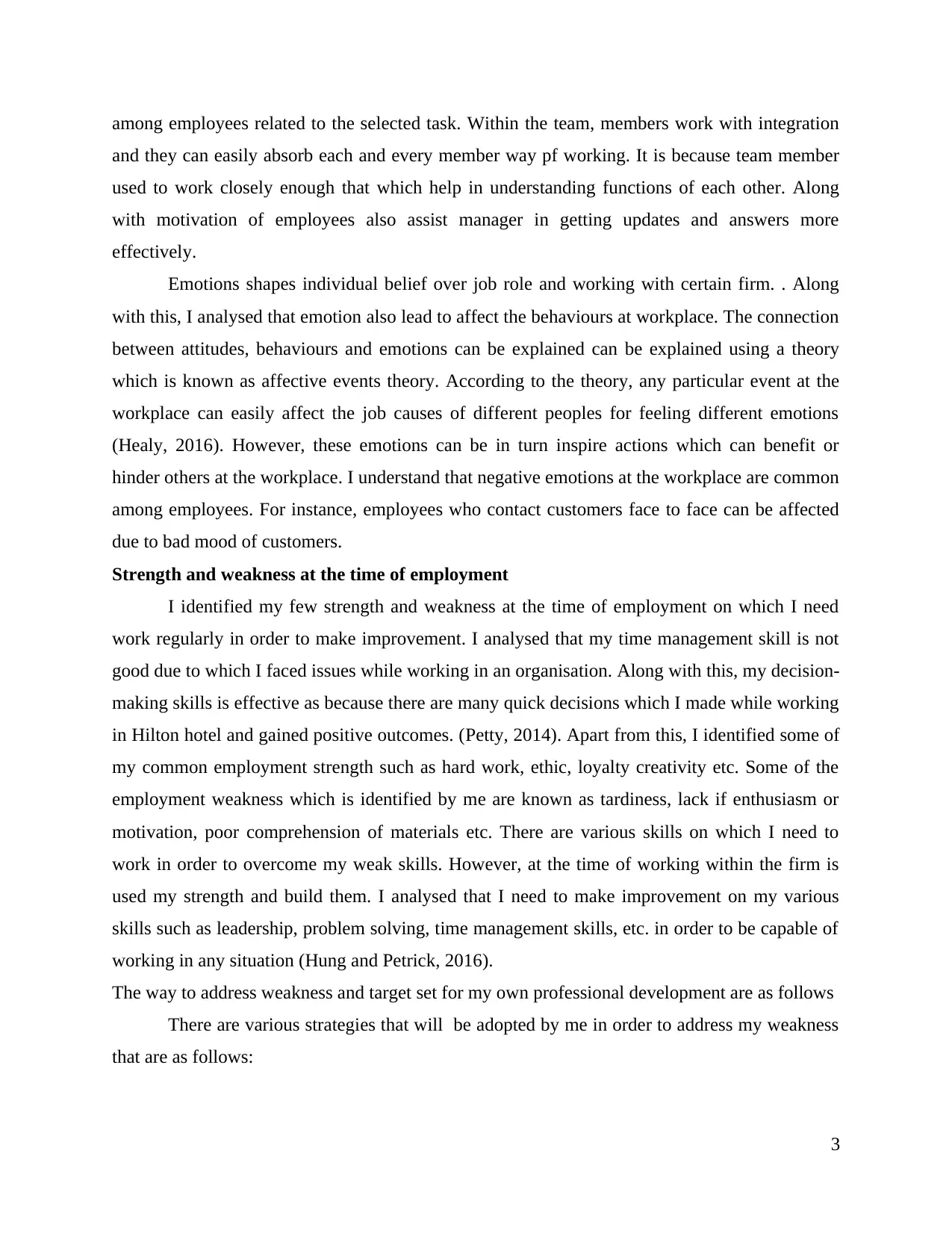
among employees related to the selected task. Within the team, members work with integration
and they can easily absorb each and every member way pf working. It is because team member
used to work closely enough that which help in understanding functions of each other. Along
with motivation of employees also assist manager in getting updates and answers more
effectively.
Emotions shapes individual belief over job role and working with certain firm. . Along
with this, I analysed that emotion also lead to affect the behaviours at workplace. The connection
between attitudes, behaviours and emotions can be explained can be explained using a theory
which is known as affective events theory. According to the theory, any particular event at the
workplace can easily affect the job causes of different peoples for feeling different emotions
(Healy, 2016). However, these emotions can be in turn inspire actions which can benefit or
hinder others at the workplace. I understand that negative emotions at the workplace are common
among employees. For instance, employees who contact customers face to face can be affected
due to bad mood of customers.
Strength and weakness at the time of employment
I identified my few strength and weakness at the time of employment on which I need
work regularly in order to make improvement. I analysed that my time management skill is not
good due to which I faced issues while working in an organisation. Along with this, my decision-
making skills is effective as because there are many quick decisions which I made while working
in Hilton hotel and gained positive outcomes. (Petty, 2014). Apart from this, I identified some of
my common employment strength such as hard work, ethic, loyalty creativity etc. Some of the
employment weakness which is identified by me are known as tardiness, lack if enthusiasm or
motivation, poor comprehension of materials etc. There are various skills on which I need to
work in order to overcome my weak skills. However, at the time of working within the firm is
used my strength and build them. I analysed that I need to make improvement on my various
skills such as leadership, problem solving, time management skills, etc. in order to be capable of
working in any situation (Hung and Petrick, 2016).
The way to address weakness and target set for my own professional development are as follows
There are various strategies that will be adopted by me in order to address my weakness
that are as follows:
3
and they can easily absorb each and every member way pf working. It is because team member
used to work closely enough that which help in understanding functions of each other. Along
with motivation of employees also assist manager in getting updates and answers more
effectively.
Emotions shapes individual belief over job role and working with certain firm. . Along
with this, I analysed that emotion also lead to affect the behaviours at workplace. The connection
between attitudes, behaviours and emotions can be explained can be explained using a theory
which is known as affective events theory. According to the theory, any particular event at the
workplace can easily affect the job causes of different peoples for feeling different emotions
(Healy, 2016). However, these emotions can be in turn inspire actions which can benefit or
hinder others at the workplace. I understand that negative emotions at the workplace are common
among employees. For instance, employees who contact customers face to face can be affected
due to bad mood of customers.
Strength and weakness at the time of employment
I identified my few strength and weakness at the time of employment on which I need
work regularly in order to make improvement. I analysed that my time management skill is not
good due to which I faced issues while working in an organisation. Along with this, my decision-
making skills is effective as because there are many quick decisions which I made while working
in Hilton hotel and gained positive outcomes. (Petty, 2014). Apart from this, I identified some of
my common employment strength such as hard work, ethic, loyalty creativity etc. Some of the
employment weakness which is identified by me are known as tardiness, lack if enthusiasm or
motivation, poor comprehension of materials etc. There are various skills on which I need to
work in order to overcome my weak skills. However, at the time of working within the firm is
used my strength and build them. I analysed that I need to make improvement on my various
skills such as leadership, problem solving, time management skills, etc. in order to be capable of
working in any situation (Hung and Petrick, 2016).
The way to address weakness and target set for my own professional development are as follows
There are various strategies that will be adopted by me in order to address my weakness
that are as follows:
3
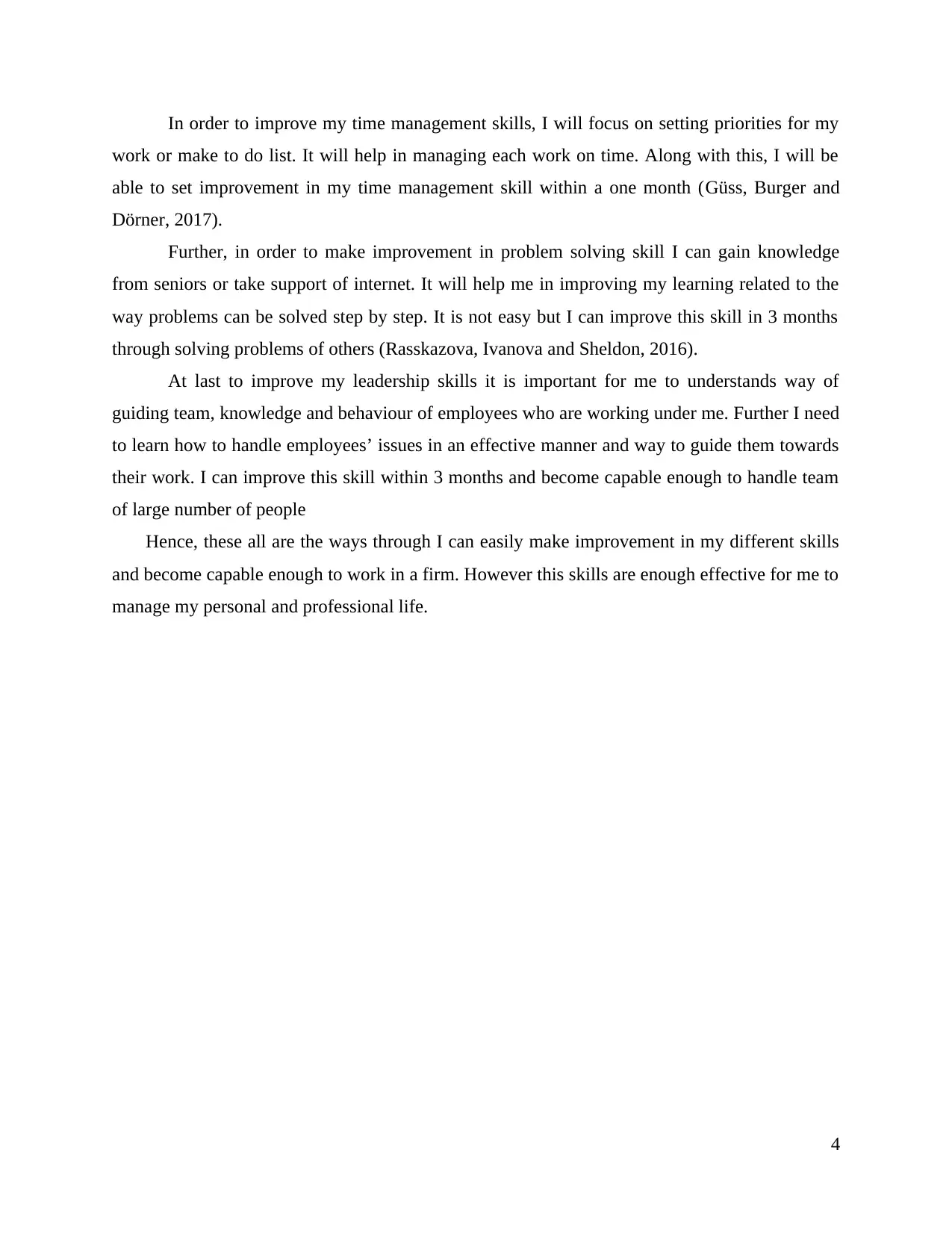
In order to improve my time management skills, I will focus on setting priorities for my
work or make to do list. It will help in managing each work on time. Along with this, I will be
able to set improvement in my time management skill within a one month (Güss, Burger and
Dörner, 2017).
Further, in order to make improvement in problem solving skill I can gain knowledge
from seniors or take support of internet. It will help me in improving my learning related to the
way problems can be solved step by step. It is not easy but I can improve this skill in 3 months
through solving problems of others (Rasskazova, Ivanova and Sheldon, 2016).
At last to improve my leadership skills it is important for me to understands way of
guiding team, knowledge and behaviour of employees who are working under me. Further I need
to learn how to handle employees’ issues in an effective manner and way to guide them towards
their work. I can improve this skill within 3 months and become capable enough to handle team
of large number of people
Hence, these all are the ways through I can easily make improvement in my different skills
and become capable enough to work in a firm. However this skills are enough effective for me to
manage my personal and professional life.
4
work or make to do list. It will help in managing each work on time. Along with this, I will be
able to set improvement in my time management skill within a one month (Güss, Burger and
Dörner, 2017).
Further, in order to make improvement in problem solving skill I can gain knowledge
from seniors or take support of internet. It will help me in improving my learning related to the
way problems can be solved step by step. It is not easy but I can improve this skill in 3 months
through solving problems of others (Rasskazova, Ivanova and Sheldon, 2016).
At last to improve my leadership skills it is important for me to understands way of
guiding team, knowledge and behaviour of employees who are working under me. Further I need
to learn how to handle employees’ issues in an effective manner and way to guide them towards
their work. I can improve this skill within 3 months and become capable enough to handle team
of large number of people
Hence, these all are the ways through I can easily make improvement in my different skills
and become capable enough to work in a firm. However this skills are enough effective for me to
manage my personal and professional life.
4
⊘ This is a preview!⊘
Do you want full access?
Subscribe today to unlock all pages.

Trusted by 1+ million students worldwide
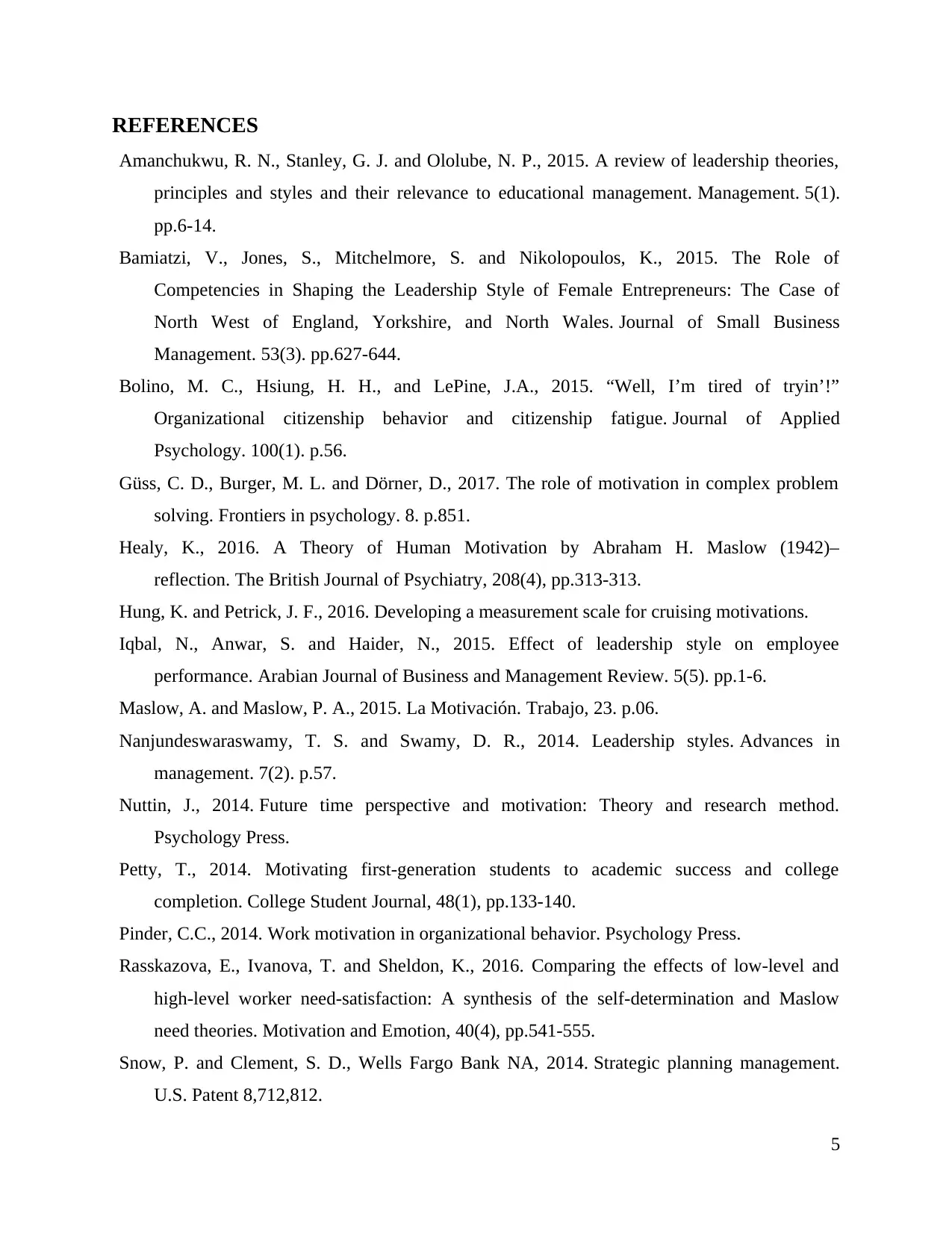
REFERENCES
Amanchukwu, R. N., Stanley, G. J. and Ololube, N. P., 2015. A review of leadership theories,
principles and styles and their relevance to educational management. Management. 5(1).
pp.6-14.
Bamiatzi, V., Jones, S., Mitchelmore, S. and Nikolopoulos, K., 2015. The Role of
Competencies in Shaping the Leadership Style of Female Entrepreneurs: The Case of
North West of England, Yorkshire, and North Wales. Journal of Small Business
Management. 53(3). pp.627-644.
Bolino, M. C., Hsiung, H. H., and LePine, J.A., 2015. “Well, I’m tired of tryin’!”
Organizational citizenship behavior and citizenship fatigue. Journal of Applied
Psychology. 100(1). p.56.
Güss, C. D., Burger, M. L. and Dörner, D., 2017. The role of motivation in complex problem
solving. Frontiers in psychology. 8. p.851.
Healy, K., 2016. A Theory of Human Motivation by Abraham H. Maslow (1942)–
reflection. The British Journal of Psychiatry, 208(4), pp.313-313.
Hung, K. and Petrick, J. F., 2016. Developing a measurement scale for cruising motivations.
Iqbal, N., Anwar, S. and Haider, N., 2015. Effect of leadership style on employee
performance. Arabian Journal of Business and Management Review. 5(5). pp.1-6.
Maslow, A. and Maslow, P. A., 2015. La Motivación. Trabajo, 23. p.06.
Nanjundeswaraswamy, T. S. and Swamy, D. R., 2014. Leadership styles. Advances in
management. 7(2). p.57.
Nuttin, J., 2014. Future time perspective and motivation: Theory and research method.
Psychology Press.
Petty, T., 2014. Motivating first-generation students to academic success and college
completion. College Student Journal, 48(1), pp.133-140.
Pinder, C.C., 2014. Work motivation in organizational behavior. Psychology Press.
Rasskazova, E., Ivanova, T. and Sheldon, K., 2016. Comparing the effects of low-level and
high-level worker need-satisfaction: A synthesis of the self-determination and Maslow
need theories. Motivation and Emotion, 40(4), pp.541-555.
Snow, P. and Clement, S. D., Wells Fargo Bank NA, 2014. Strategic planning management.
U.S. Patent 8,712,812.
5
Amanchukwu, R. N., Stanley, G. J. and Ololube, N. P., 2015. A review of leadership theories,
principles and styles and their relevance to educational management. Management. 5(1).
pp.6-14.
Bamiatzi, V., Jones, S., Mitchelmore, S. and Nikolopoulos, K., 2015. The Role of
Competencies in Shaping the Leadership Style of Female Entrepreneurs: The Case of
North West of England, Yorkshire, and North Wales. Journal of Small Business
Management. 53(3). pp.627-644.
Bolino, M. C., Hsiung, H. H., and LePine, J.A., 2015. “Well, I’m tired of tryin’!”
Organizational citizenship behavior and citizenship fatigue. Journal of Applied
Psychology. 100(1). p.56.
Güss, C. D., Burger, M. L. and Dörner, D., 2017. The role of motivation in complex problem
solving. Frontiers in psychology. 8. p.851.
Healy, K., 2016. A Theory of Human Motivation by Abraham H. Maslow (1942)–
reflection. The British Journal of Psychiatry, 208(4), pp.313-313.
Hung, K. and Petrick, J. F., 2016. Developing a measurement scale for cruising motivations.
Iqbal, N., Anwar, S. and Haider, N., 2015. Effect of leadership style on employee
performance. Arabian Journal of Business and Management Review. 5(5). pp.1-6.
Maslow, A. and Maslow, P. A., 2015. La Motivación. Trabajo, 23. p.06.
Nanjundeswaraswamy, T. S. and Swamy, D. R., 2014. Leadership styles. Advances in
management. 7(2). p.57.
Nuttin, J., 2014. Future time perspective and motivation: Theory and research method.
Psychology Press.
Petty, T., 2014. Motivating first-generation students to academic success and college
completion. College Student Journal, 48(1), pp.133-140.
Pinder, C.C., 2014. Work motivation in organizational behavior. Psychology Press.
Rasskazova, E., Ivanova, T. and Sheldon, K., 2016. Comparing the effects of low-level and
high-level worker need-satisfaction: A synthesis of the self-determination and Maslow
need theories. Motivation and Emotion, 40(4), pp.541-555.
Snow, P. and Clement, S. D., Wells Fargo Bank NA, 2014. Strategic planning management.
U.S. Patent 8,712,812.
5
Paraphrase This Document
Need a fresh take? Get an instant paraphrase of this document with our AI Paraphraser
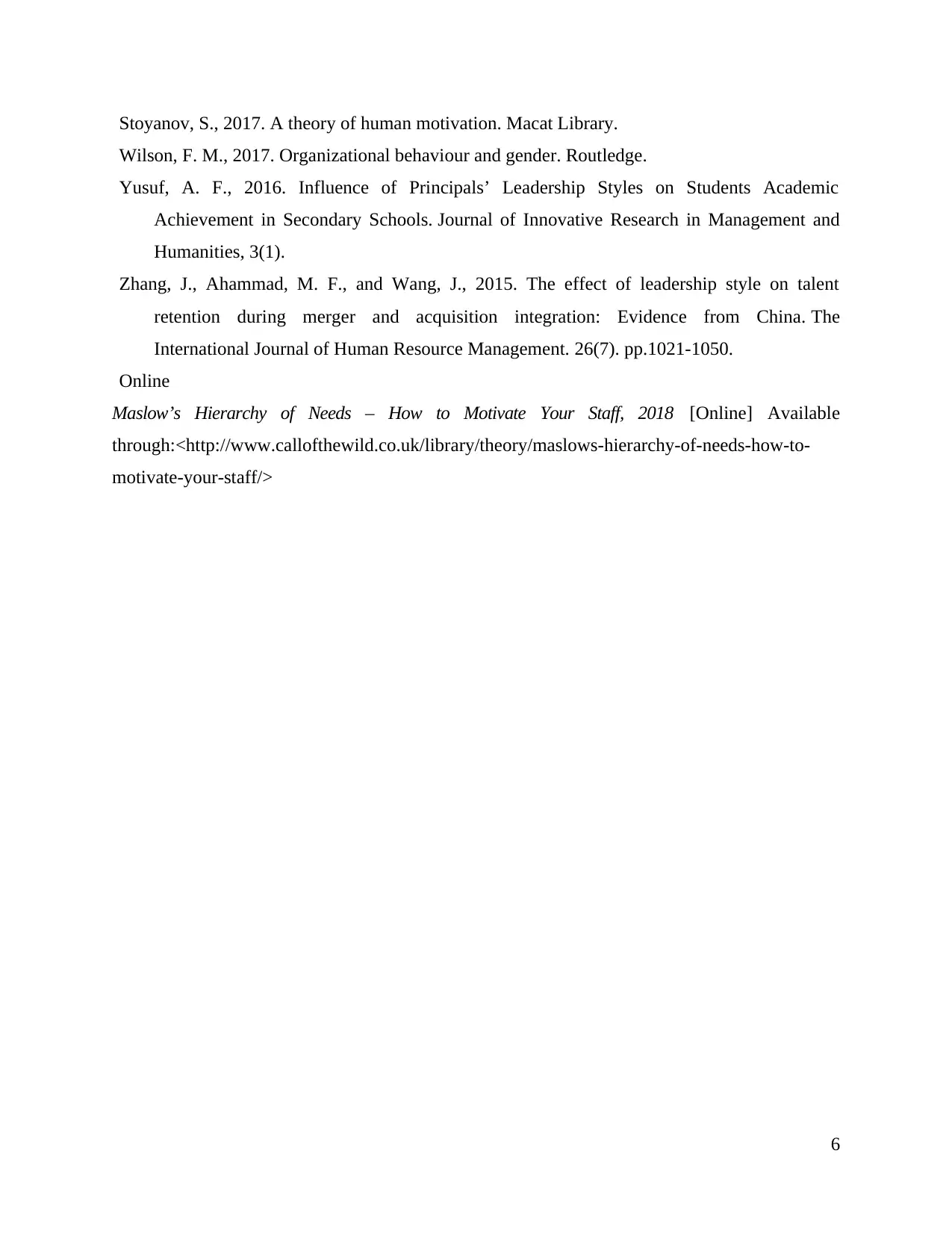
Stoyanov, S., 2017. A theory of human motivation. Macat Library.
Wilson, F. M., 2017. Organizational behaviour and gender. Routledge.
Yusuf, A. F., 2016. Influence of Principals’ Leadership Styles on Students Academic
Achievement in Secondary Schools. Journal of Innovative Research in Management and
Humanities, 3(1).
Zhang, J., Ahammad, M. F., and Wang, J., 2015. The effect of leadership style on talent
retention during merger and acquisition integration: Evidence from China. The
International Journal of Human Resource Management. 26(7). pp.1021-1050.
Online
Maslow’s Hierarchy of Needs – How to Motivate Your Staff, 2018 [Online] Available
through:<http://www.callofthewild.co.uk/library/theory/maslows-hierarchy-of-needs-how-to-
motivate-your-staff/>
6
Wilson, F. M., 2017. Organizational behaviour and gender. Routledge.
Yusuf, A. F., 2016. Influence of Principals’ Leadership Styles on Students Academic
Achievement in Secondary Schools. Journal of Innovative Research in Management and
Humanities, 3(1).
Zhang, J., Ahammad, M. F., and Wang, J., 2015. The effect of leadership style on talent
retention during merger and acquisition integration: Evidence from China. The
International Journal of Human Resource Management. 26(7). pp.1021-1050.
Online
Maslow’s Hierarchy of Needs – How to Motivate Your Staff, 2018 [Online] Available
through:<http://www.callofthewild.co.uk/library/theory/maslows-hierarchy-of-needs-how-to-
motivate-your-staff/>
6
1 out of 8
Related Documents
Your All-in-One AI-Powered Toolkit for Academic Success.
+13062052269
info@desklib.com
Available 24*7 on WhatsApp / Email
![[object Object]](/_next/static/media/star-bottom.7253800d.svg)
Unlock your academic potential
Copyright © 2020–2026 A2Z Services. All Rights Reserved. Developed and managed by ZUCOL.





